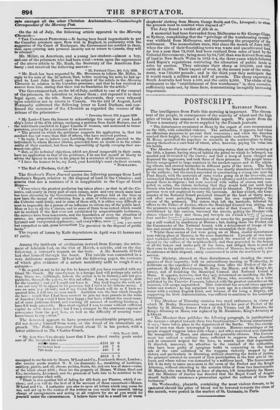On the 3d of July, the following article appeared in
the Morning Chronicle- d, THE CANADIAN Parsoxerts.—It having been found impracticable to put the Canadian prisoners upon their trial in England, in conformity with the suggestion of the Court of Exchequer, the Government has notified to them, that, upon entering into personal security not to return to Canada, they will be released."
Mr. Miller, an American, and a young law-student—almost a boy, and one of the prisoners who had been tried—wrote upon the appearance of the above article to Mr. Rush, the Secretary.,of the American Em- bassy ; and received the following answer- " 23, Portland Place, 8th July 1839. . • " Mr. Rush has been requested by Mr. Stevenson to inform Mr. Miller, in reply to his note of the 3d instant, that, before receiving his note, he had ap- plied to Lord John Russell upon the subject of the article in the .3lorning Chronicle in relation to the Canadian prisoners ; and that he has received an answer from him, stating that there was no foundation for the article."
The Government had, on the 2d of July, notified to one of the counsel of the prisoners, its intention to release them ; and repeated it to their legal agent, on the 9th. Some days afterwards, they were released upon condition not to return to Canada. On the 22d of August, Lord ;,11ormanby addressed the following letter to Lord Durham, and con- firmed the statement of the Chronicle as regarded the reasons of the release of the prisoners-
" Downing Street, 223 August 1839.
" My Lord—I have the honour to acknowledge the receipt of your Lord- ship's letter of the 27th ultimo, enclosing a petition from Jacob Beemer, one of ,the individuals convicted in Upper Canada of treason, and sentenced to trans- :portatiou, praying for a remission of his sentence. " The ground on which the petitioner supports his application is, that his conduct was not worse than that of others, who have received pardons. "In reply, I am to inform your Lordship, that the pardons granted to the individuals to whom Beemer alludes, proceeded from no doubt as to the crimi- nality of their conduct, but from the unpossibility of legally carrying their sen- tences into eftect. " But, as the technical objections, which are .found insuperable in their cases, have no application to that of the petitioner, 1 do not feel myself at liberty to advise the Queen to accede to his prayer for a remission of his sentence. " I have the honour to he, my Lord, your Lordship's most obedient servant, " NORMANDY. " The Earl of Durham, G.C.B."


























 Previous page
Previous page